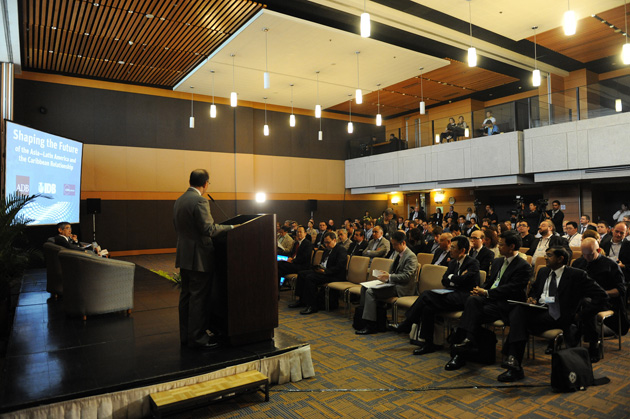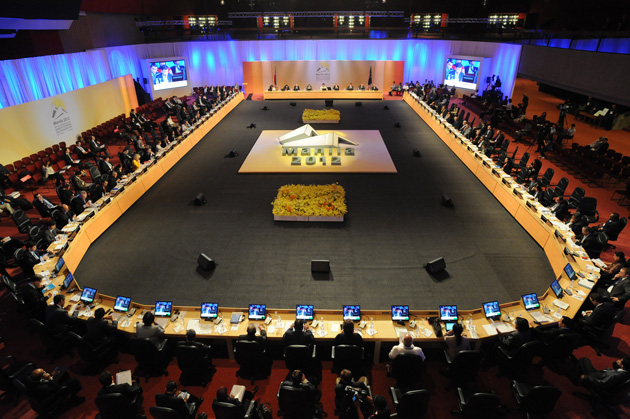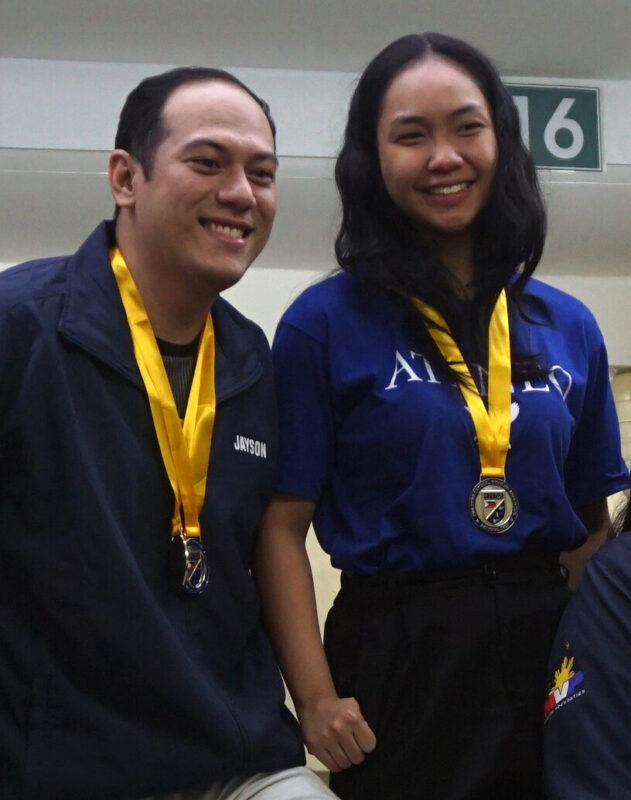
PLANNING ASIA'S FUTURE. State dignitaries and finance ministers discuss proposals for inclusive growth in Asian economies. Photo by Ariel Javellana for the Asian Development Bank.
CALLED THE “coming out party of the Aquino administration” by Finance Secretary Cesar Purisima, the 45th Annual Meeting of the Board of Governors of the Asian Development Bank (ADB) was hailed a “great success” by both Purisima and ADB President Haruhiko Kuroda.
Up to 5,000 delegates, including finance ministers, policymakers, and prominent business leaders, attended the four-day conference held at the Philippine International Convention Center (PICC) from May 2 to 5.
Issues of the region
The conference tackled the Asian response to the global economic downturn, regional food security, and ties with Latin America and other developing economies.
In his annual address to delegates, Kuroda called for more reforms to support “long-term, inclusive growth.”
Recognizing the stellar performance of the region’s economies, he points out Asia’s “growing role in a transforming world.” This, he said, must be coupled with the need to have “green, inclusive, and knowledge-driven” growth.
The ADB also pledged to support countries not just financially, but intellectually through knowledge-sharing and advisory operations.
It also set an ambitious target for an inclusive banking system that serves the region’s poor by the year 2020. World Bank data showed that only 28% of adults in the Asia Pacific had savings accounts last year (although this figure is still higher than the 10% developing world average.)
Meanwhile, ADB Chief Economist Changyong Rhee called for a new, adequately established financial system for Asia. This involved a reorganization of international financial safety nets and regulations.
In response to the Eurozone crisis, the meeting also resulted in doubling the Chiang Mai Initiative, a pool of funds that can be borrowed by countries in the region in times of economic instability, to $240 billion. The initiative was originally created in 2000, after the similarly debilitating Asian financial crisis in 1997.
Ateneo Economics Department Chairperson Luis Dumlao, PhD, said that this effort shows interdependence as a principle of regionalism. “If we are integrated with Europe and Europe goes through crisis, we have America and Asia to do business. If we are integrated in Asia and Asia goes through crisis, we have the rest of the world to do business [with],” he explained.
A $485-billion ASEAN Infrastructure Fund was also created, to help finance the region’s infrastructure needs in a time of rapid urbanization.
“Hiding the truth”
However, criticisms were leveled against the government’s allegedly extravagant preparations. Billboards were erected in front of some Manila informal settler communities, a move reminiscent of former first lady Imelda Marcos’ acts when international conferences were held in the country.
The government also spent P300 million for the conference, hoping to yield returns through investment.
The government responded by saying such preparations are “normal,” just as any house is supposed to be clean for guests.
During the conference, various groups such as the Freedom from Debt Coalition launched protests outside the PICC, denouncing the ADB as a “tool for corporate greed,” benefitting only the private sector at the expense of people and the environment.
The Bank
Modeled after the World Bank in its international lending capabilities, the ADB was formed in 1966 and is based in Ortigas Center, Metro Manila. Its Board of Governors is composed of finance ministers, one from each of the 67 member countries. As the host, Purisima is also this year’s chairman of the board.
Dumlao highlighted the significance of ADB to the Philippines’ unstable economy. “Each country more or less is responsible for the development of any other country. In Asia, we pool funds and technical knowhow together. This united pool and technical expertise is put together in the Asian Development Bank so that all countries can uniformly influence and help in the development of a member country like the Philippines,” he said.
Further, Dumlao added that he believes that the ADB has affected the country positively. “Some may say [it is] not enough, some [say it is] more than enough, but the consensus is on the positive.”
Assessing the ADB
While many believe that the directives of the ADB are promising as solutions to regional problems, some of its recommendations have been questionable. The Assembly President Coco Navarro cited the Philippines as an example. “During the ADB meeting, the Philippines was commended for its conditional cash transfer project, something that I feel has to be reevaluated. I have always been resistant towards the idea of individualized grants that spoon-feed more than empower families,” she said.
Given that countries are associated to aid each other through the ADB, there are still doubts whether benefits are fairly distributed among countries.
Dumlao deemed fit to evaluate the beggar-thy-neighbor strategy. In economics, this means that a country aims to solve its economic crisis at the expense of others. According to him, “This kind of mentality is the fundamental economic reason for the biggest wars in the world.”
Instead of having such a way of thinking in looking at the mechanism behind the ADB, Dumlao continued, “For the most part, such multilateral institutions were built and operate on the notion that what is good for developing countries is also good for developed ones, and vice versa. There are always exceptions, but generally, [the ADB] has contributed to the extent of helping nations for the benefit of the world.”




